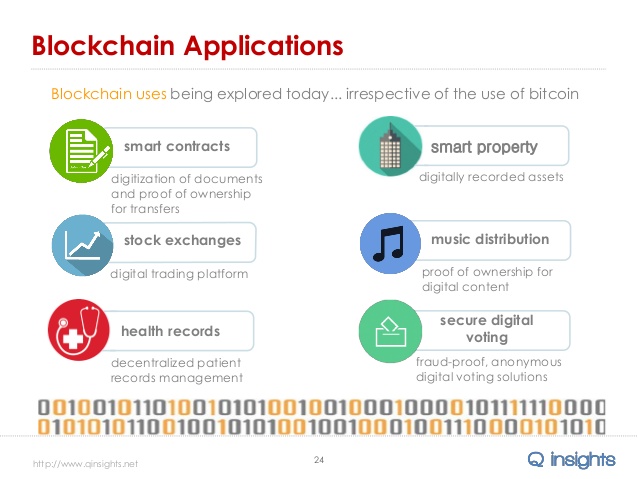Blockchain Technology Collider
This collider will focus on emerging applications of blockchain technology beyond the commonly known “bitcoin” use case. Launch date is March 2nd at 5pm, please RSVP at http://blockchaincollider.eventbrite.com. Contact dlaw@berkeley.edu with questions. Click here for more information.
The Blockchain is a powerful yet widely misunderstood invention that has the ability to change the way we look at the digital world. Over a year ago, Marc Andreessen, one of Silicon Valley’s most respected entrepreneurs, listed the blockchain’s distributed consensus model as the most important invention since the Internet itself. His firm has since then invested widely in a number of Bitcoin related startups.
The Blockchain, essentially a permission-less database based on bitcoin protocol that serves as the public ledger for bitcoin transactions, has started to attract the attention of not just the financial services industry but many others. The larger promise that Blockchain carries, is that the intermediate party is no longer required – custodians, notaries & certain government agencies have been left redundant and unrequired, prompting entrepreneurs to think of Blockchain beyond just its Bitcoin accounting functions.
For example, entrepreneurs are trying to explore the possibility of Blockchain in trading and settlement applications, including reconciliation and matching; it can also potentially be used in contracts relating to financial derivatives, bonds, real estate, smart investment plans and others. A cryptographic network could be used for identity verification purposes using people’s passport and social security numbers, and such applications could also be extended to medical records & patient IDs.

Possible industries that may benefit from Blockchain applications
It is important to recognize however, that these are still early days, and entrepreneurs must be careful and exercise discipline when looking at options. “Scrutinize your business processes and where blockchain would add value; otherwise, you’ll spend money on use cases and solutions that aren’t right for you,” says Eric Piscini of Deloitte. It’s important to set rules, validate markets, and back assets being invested.
Blockchain technology holds a great deal of potential for a range of organizations. “If you’re disciplined with your innovation, you can really identify ways to use the blockchain to streamline processes and create new opportunities,” Piscini says.
Blockchain Technology Collider
This collider will focus on emerging applications of blockchain technology beyond the commonly known “bitcoin” use case. Launch date is March 2nd at 5pm, please RSVP at http://blockchaincollider.eventbrite.com. Contact dlaw@berkeley.edu with questions. Click here for more information.
The Blockchain is a powerful yet widely misunderstood invention that has the ability to change the way we look at the digital world. Over a year ago, Marc Andreessen, one of Silicon Valley’s most respected entrepreneurs, listed the blockchain’s distributed consensus model as the most important invention since the Internet itself. His firm has since then invested widely in a number of Bitcoin related startups.
The Blockchain, essentially a permission-less database based on bitcoin protocol that serves as the public ledger for bitcoin transactions, has started to attract the attention of not just the financial services industry but many others. The larger promise that Blockchain carries, is that the intermediate party is no longer required – custodians, notaries & certain government agencies have been left redundant and unrequired, prompting entrepreneurs to think of Blockchain beyond just its Bitcoin accounting functions.
For example, entrepreneurs are trying to explore the possibility of Blockchain in trading and settlement applications, including reconciliation and matching; it can also potentially be used in contracts relating to financial derivatives, bonds, real estate, smart investment plans and others. A cryptographic network could be used for identity verification purposes using people’s passport and social security numbers, and such applications could also be extended to medical records & patient IDs.

Possible industries that may benefit from Blockchain applications
It is important to recognize however, that these are still early days, and entrepreneurs must be careful and exercise discipline when looking at options. “Scrutinize your business processes and where blockchain would add value; otherwise, you’ll spend money on use cases and solutions that aren’t right for you,” says Eric Piscini of Deloitte. It’s important to set rules, validate markets, and back assets being invested.
Blockchain technology holds a great deal of potential for a range of organizations. “If you’re disciplined with your innovation, you can really identify ways to use the blockchain to streamline processes and create new opportunities,” Piscini says.


